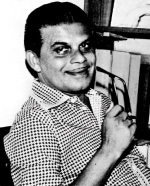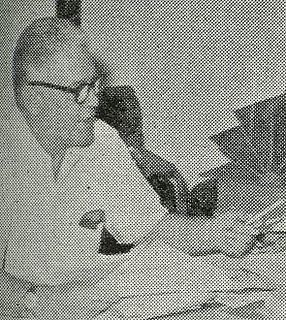
The Colombo Plan is a regional organisation of 27 countries designed to strengthen economic and social development of member countries in the Asia-Pacific region. It was established by Great Britain in Colombo, Ceylon, in 1950. The primary focus of its work is on the development of human resources in the region. Aid to education 1950 to 1983 came to $72 billion, of which $41 billion came from the United States.

Vernon Corea was a pioneer radio broadcaster with 45 years of public service broadcasting both in Sri Lanka and the UK. He joined Radio Ceylon, South Asia's oldest radio station, in 1956 and later the Sri Lanka Broadcasting Corporation. During his time he presented some of the most popular radio shows in South Asia, including The Maliban Show, Dial-a-Disc, Holiday Choice, Two For the Money, Take It Or Leave It, Saturday Stars, To Each His Own, Kiddies Corner, and Old Folks at Home. He was well known not only in Sri Lanka, but right across the Indian Sub-Continent from the late 1950s to the 1970s – this was in the heyday of Radio Ceylon, the oldest radio station in South Asia.
Radio Ceylon is a radio station based in Sri Lanka and the first radio station in Asia. Broadcasting was started on an experimental basis by the colonial Telegraph Department in 1923, just three years after the inauguration of broadcasting in Europe.

The Sri Lanka Broadcasting Corporation (SLBC) came into existence on 5 January 1967 when Radio Ceylon became a public corporation. Dudley Senanayake who was the Prime Minister of Ceylon in 1967 ceremonially opened the newly established Ceylon Broadcasting Corporation along with Minister Ranasinghe Premadasa and the Director General of the CBC, Neville Jayaweera.The first board of Directors of CBC consisted of Mr. Neville Jayaweera (CCS), Mr.A.L.M.Hashim, Mr.Dharmasiri Kuruppu, Mr. K.A.G. Perera and Mr. Devar Surya Sena. After the first board meeting it was decided unanimously to appoint the chairman, Mr.Jayaweera, as the new Director General.

Radio broadcasting in Sri Lanka dates to 1923. Radio broadcasting, like other forms of media in Sri Lanka, is generally divided along linguistic lines with state and private media operators providing services in Sinhala, Tamil, and English language.
Jimmy Bharucha, was a Sri-Lankan Parsi broadcaster called a 'colossus in Sri Lanka's broadcasting world'. Bharucha died in Colombo in June 2005.
Greg Roskowski was an announcer of Radio Ceylon during the height of the station's popularity in the 1950s in the Indian Subcontinent. Roskowski, born of a Japanese mother and a Polish father, was the booming voice of Radio Ceylon's morning radio programs.

Nihal Bhareti was a popular radio announcer with the Sri Lanka Broadcasting Corporation in Colombo. He joined Radio Ceylon in the 1960s. His mellow voice attracted hundreds of fans in Sri Lanka as well as on the Indian sub-continent.

Karunaratne Abeysekera was one of Sri Lanka's most famous Sinhala broadcasters. He was also a poet and songwriter and was widely admired for his excellent command of Sinhala.
Edward Harper was a British engineer who travelled to Colombo in 1921 to work in the Ceylon Telegraph Department. Harper was appointed Chief Engineer. He had an innovative mind and his passion was broadcasting. Edward Harper is known as the 'Father of Broadcasting,' in Ceylon.

Clifford R. Dodd was an administrator and radio expert, with twenty years experience in broadcasting in Australia, before he arrived in Sri Lanka. He was sent by the Australian Government under the Colombo Plan to work in Radio Ceylon. He was appointed Director of the newly formed Commercial Service of Radio Ceylon.
Timothy Navaratnam Horshington was a pioneering broadcaster of Radio Ceylon, the oldest radio station in South Asia. Horshington was one of the earliest Tamil announcers to be appointed to the panel of announcers in the 1950s by Livy Wijemanne and Clifford Dodd.He was very popular with listeners in the island - Ceylonese enjoyed listening to his mellow voice over Radio Ceylon - the radio station ruled the airwaves in the 1950s and 1960s in South Asia.
Shirley Perera was a popular announcer of the 1960s and 1970s in Radio Ceylon - the oldest radio station in South Asia. Perera presented some of the well known radio programmes of the station including 'You call the Tune.'
Pearl Ondaatje was a pioneer of Radio Ceylon, the oldest radio station in South Asia. She was one of the radio station's first female newsreaders and a presenter of radio programs, including programs for women listeners of the radio station.
S. P. Mylvaganam was a Sri Lankan radio broadcaster. He was the first Tamil language announcer for the Commercial Service of Radio Ceylon. He had fans across Sri Lanka and India.

Vijaya Corea is a radio and television broadcaster and one of Sri Lanka's most well known media personalities. Corea is a household name in Sri Lanka, synonymous with broadcasting and show business for over four decades, and has often been referred to as Sri Lanka's No. 1 Compere.
Owen de Abrew was one of Sri Lanka's leading ballroom dance personalities, he was known as the 'King of Ballroom dancing' in Colombo.

Mapatunage James "M. J." Perera was a Sri Lankan civil servant with nine members in his family in Udumulla, Padukka. He created broadcasting history by being the first Ceylonese Director General of Radio Ceylon, the oldest radio station in South Asia, taking over the helm from John Lampson of the BBC.
FM99 Sri Lanka was a Sri Lankan radio station. FM99 started broadcasting on 13 June 1993, as the first private radio channel in Sri Lanka, under the license granted to then director Livy Wijemanne. The radio station was shut down on 31 January 1996 for separation of its mediums. The station broadcast in three languages on the same channel, at different times of day:
Mervyn Jayasuriya was a veteran announcer with Radio Ceylon - the oldest radio station in South Asia. Jayasuriya presented some of the most popular radio programmes over the airwaves of Radio Ceylon, such as "Roving Mike" and "Sports Newsreel". Millions tuned into the programmes, right across South Asia.